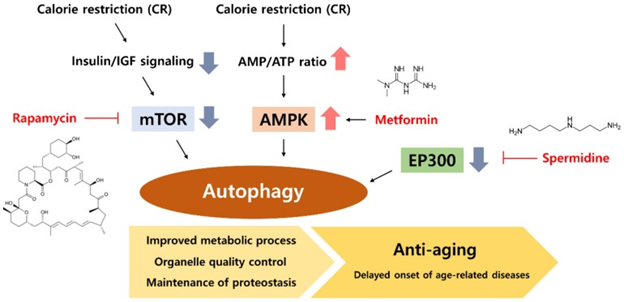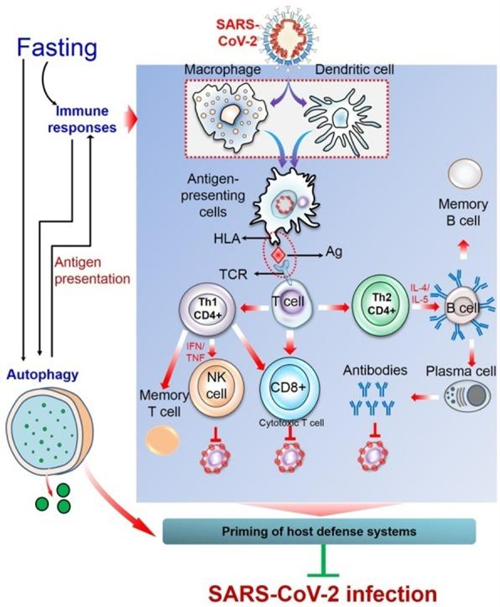As mentioned in the previous article, autophagy plays many major roles within our systems and is also a form of cellular adaptation system to various types of stress. Stress is defined here, as a factor which changes homeostatic conditions, whereby the body must adapt in order achieve balance once again. It should be obvious by now, concerning the importance of autophagy, how crucial it is to scientists, to modulate such a mechanism for a desired outcome. In this article, I will explicitly discuss the effect of a particular stress; the stress elicited through fasting.
I will first start off with the different pathways whereby autophagy is stimulated in order to bring clarity as to why fasting would be considered a prevalent topic regarding this subject. There are many different stimuli which induce the onset of autophagy; some of which include:
- Nutritional/energetic stress
- Particular pathogenic stimuli
- Redox stress (oxidative stress)
- Endoplasmic reticulum stress
- Hypoxia (tissue deprivation from adequate supplies of oxygen)
- An accumulation of misfolded proteins
- DNA and/or mitochondrial damage
As you can see here, nutritional/energetic stress is a stimulus for the onset of autophagy. Would stimulating its onset have positive or negative consequences? I will explore this specific point in regards to the stress of fasting as a means of calorie restriction.
Fasting and calorie restriction has been a relatively recent lifestyle habit considered in high regard, when discussing overall health and longevity. Fasting/calorie restriction is considered a “good stress” on the system because the body will adapt to the present conditions in order to reach homeostasis. In doing so, the body enters into ketosis (after 12-24 hours of fasting), whereby the body will start breaking down fat reserved instead of glucose as its source of energy. Considering its positive attributes, does excessive fasting elicit positive or negative results on autophagy? Would short-term fasting or long-term fasting aid or endanger the mechanisms of autophagy? As mentioned in the previous article, autophagy can sometimes be sequestered by pathogens and cancers for their own benefit rather than our own. Could this be in any way damaging or helpful? Let us find out…
Short-Term vs. Long-Term Fasting
Upon fasting for approximately 6-8 hours, macroautophagy is initiated. In this stage of fasting, in order for the body to provide itself with sources of energy, macroautophagy will degrade cellular components at random. Depending on the organ/tissues, long-term autophagy is activated after approximately 12 hours of fasting, whereby CMA (chaperone-mediated autophagy) would selectively degrade non-essential proteins.
Chronic Fasting/Severe Starvation
It has been shown that chronic fasting in fact, inhibits the function of autophagy and can therefore lead to neuronal damage within the system rather than benefit the overall individual. In such cases, this would constitute severe starvation. As you can imagine, in severe chronic conditions, stress levels and the energetic balance within the body would reach a point which autophagy would create too much damage if it were to be activated as it would in normal conditions. This should make sense, as autophagy would, at this point, be breaking down essential proteins in order to sustain survival. This is why under chronic fasting; autophagy would be somewhat inhibited and would only be initiated as a means for survival. It would only be in severe and chronic cases such as these, that the modulating effects of autophagy would be too excessive and elicit a negative response on the body.
Autophagy, Fasting & Longevity
Since calorie restriction and calorie restriction mimetics are linked to longevity, the question remains; are the longevity benefits of calorie restriction derived from the action of autophagy? Is it vice-versa? Or are the pathways for cellular signaling and cellular metabolism more involved with these longevity benefits?
There are many different components involved within the cellular signaling pathways of autophagy and calorie restriction. Cellular pathways by which cellular metabolism, and therefore autophagy is regulated, is mostly that of the mTOR & AMPK pathways.

“Calorie restriction (CR) and CR mimetics modulate the autophagy process” (Chung et al., 2019)
mTOR & AMPK Pathways
The mammalian target of rapamycin (a calorie restriction mimetic; a gerosuppressive agent) is a signaling molecule (mTOR) that modulates cellular growth/proliferation, energetic homeostasis, as well as autophagy. It can form a complexes; the mTOR complex 1 (TORC1) and the mTOR complex 2 (TORC2), and it is usually regulated/governed by:
- Growth factors
- Cellular stressors
- Energy levels
Autophagy is also governed/regulated by one of the main nutrient-sensing signaling proteins; AMP-activated protein kinase (AMPK). What is not depicted from the image above, is that when AMPK is activated, it will automatically inhibit the activation of mTOR. Therefore, under calorie restriction/fasting conditions, insulin levels as well as the insulin-like growth factor (IGF) signaling will decrease. This will thereby decrease the action of mTOR signaling, which, in turn, activates autophagy. Under these very same conditions, energy levels will drop (ATP levels drop; the body’s main source of energy) and the levels of AMP will increase.
** When using energy in the body, ATP, adenosine triphosphate (three phosphate groups) undergoes hydrolysis to eventually end up with one phosphate group, AMP (adenosine monophosphate). To better understand the processes by which glucose is broken down into cellular energy (ATP), and then used as energy within the body, I suggest reviewing cellular respiration and all its complexities. **
As levels of AMP increase, AMPK is activated which then activates autophagy as well as inhibits the action of mTOR. Once you understand the gist of these signaling pathways, it all makes sense and functions very much like dominos where when one topples over, all the others will topple over as well (what scientists refer to as a signaling cascade, whereby the stimulus of one element creates a series of reactions).
What is interesting to note here from the illustration, is that there are other chemicals which can induce or inhibit these pathways, all of which are anti-aging; the most important of which would be, rapamycin, metformin & spermidine (all of which are also considered calorie restriction mimetics or gerosuppressive agents).The mTOR complex 1 (TORC1) pathway is one you may come across quite often in regards to topics on longevity pathways and longevity regulation. The reason as to why I bring this up is due to the fact that since the processes of autophagy decline with age, which is one of the associations to age-related diseases, if fasting and longevity modulators were to be introduced into the equation, the outcome could possibly be revolutionary!
Autophagy, Fasting & Immune Response
Aging in general, is attributed to many different factors. Autophagy has a clear role in the facets of aging, as previously mentioned. This topic will be explored further in my next article, where I will discuss the implication of autophagy on sirtuins as well as natural products.
You could only imagine, at this point in time, with all the information provided, the impact of autophagy on illnesses and age-related diseases. The benefits of fasting in regards to disease along with the immune system, is that it reduces inflammation (a benefit to many inflammatory diseases), and promotes cellular resistance to stress, which thereby increases immune potential. I will take this opportunity to use the current pandemic, Covid-19, as an example. As mentioned in the previous article, autophagy is also involved with antigen presentation and cellular signaling for immune responses. In the case of fasting and autophagy, the action of the immune system would be amplified. According to Hunnan and associates, “calorie restriction in the form of intermittent fasting (IF) in several clinical settings has been reported to promote several health benefits, including priming of the immune response”.

“Fasting as an intervention tool against SARS-CoV-2 infection.” (Hannan et al., 2020)
Since the pandemic is too new to provide scientific results concerning this theory/strategy, current studies provide positive groundwork. Although not a cure for this virus, the promising attributes of fasting as a method of prevention during times that the immune system may be compromised, could be used as an inexpensive and effective tool. Note however, it is not recommended to fast during times of infection, as the body should not undergo nutrient deficiency or nutritional stress under such conditions. Should you choose to fast during these immune-compromised conditions (as would be the case for some diseases and cancer therapies which I will explain in more detail later in this article), it would be recommended to be monitored by a healthcare professional. Fasting in the example of Covid-19, is a means of boosting the immune system in order to activate autophagy and immune responses, and therefore prevent the onset of infection.
In the case of cancer, fasting has been found to be an effective means to enhancing the action of autophagy along with being beneficial alongside many cancer therapies. In the previous article, I mentioned that autophagy suppresses tumor formation and will recycle damaged organelles and proteins. This in mind, it is the modulation of autophagy through fasting, that elicits anti-cancer benefits. This area of research is quite complex, as there are many factors which come into play concerning the type of cancer, the progression, therapies used etc. This is the reason why it is recommended to consult or be monitored by a healthcare professional should you choose to fast while battling cancer or any other chronic disease.
Conclusion
All-in-all, the processes of autophagy can be modulated through fasting and/or calorie restriction. There is still much research required, but one can only imagine the therapeutic benefits as well as its uses for immune conditions such as Covid-19 along with age-related diseases and cancers, if the exact conditions and mechanisms were fully known! The potential for the use of autophagy and fasting is nearly endless if a direct means to and end can be fully assessed. Considering the fact that fasting/calorie restriction is safe and an easy approach everyone can incorporate in their own unique way in their daily lives, the big picture of its benefits is extremely exciting; the ketogenic trend makes sense!
Next time you fast, rather it be for religious reasons, for weight loss, for overall wellness, or merely due to the fact that you don’t have time to eat because you’re too busy; think of how happy your autophagy systems are, creating balance and homeostasis in all your tissues and cells! Stay tuned for the next article on autophagy, where I will dive deeper and discuss its implications in more detail concerning longevity, natural products, and sirtuins!
I hope you enjoyed this article and I look forward to writing more on other relevant health topics! Feel free to message us with any comments or enquiries you may have.
Info@vitoli.com
Other suggested topics:
- Fasting, Article 1: The Biological Basics of Reflection
- Fasting Article 4: Stimulate Repair and Slow Down Aging
- Longevity? Prevention? Disease? – Who Cares!
References:
- Bagherniya M, Butler AE, Barreto GE, Sahebkar A. The effect of fasting or calorie restriction on autophagy induction: A review of the literature. Ageing Res Rev. 2018;47:183-197. doi:10.1016/j.arr.2018.08.004
- Morselli E, Maiuri MC, Markaki M, et al. Caloric restriction and resveratrol promote longevity through the Sirtuin-1-dependent induction of autophagy. Cell Death Dis. 2010;1(1):e10. Doi:10.1038/cddis.2009.8
- Varghese N, Werner S, Grimm A, Eckert A. Dietary Mitophagy Enhancer: A Strategy for Healthy Brain Aging? Antioxidants (Basel). 2020 Sep 29;9(10):E932. doi: 10.3390/antiox9100932. PMID: 33003315.
- Alirezaei M, Kemball CC, Flynn CT, Wood MR, Whitton JL, Kiosses WB. Short-term fasting induces profound neuronal autophagy. Autophagy. 2010;6(6):702-710. doi:10.4161/auto.6.6.12376
- Antunes F, Erustes AG, Costa AJ, et al. Autophagy and intermittent fasting: the connection for cancer therapy?. Clinics (Sao Paulo). 2018;73(suppl 1):e814s. Published 2018 Dec 10. doi:10.6061/clinics/2018/e814s
- Cuervo, A., Wong, E. Chaperone-mediated autophagy: roles in disease and aging. Cell Res 24, 92–104 (2013). https://doi.org/10.1038/cr.2013.153
- Bejarano E, Cuervo AM. Chaperone-mediated autophagy. Proc Am Thorac Soc. 2010;7(1):29-39. doi:10.1513/pats.200909-102JS
- Glick D, Barth S, Macleod KF. Autophagy: cellular and molecular mechanisms. J Pathol. 2010;221(1):3-12. doi:10.1002/path.2697
- Parzych KR, Klionsky DJ. An overview of autophagy: morphology, mechanism, and regulation. Antioxid Redox Signal. 2014;20(3):460-473. doi:10.1089/ars.2013.5371
- Schuck, Sebastian. Microautophagy – distinct molecular mechanisms handle cargoes of many sizes. Journal of Cell Science. Published 9 September 2020; 133: jcs246322 doi: 10.1242/jcs.246322
- Ju Huang & Daniel J. Klionsky (2007) Autophagy and Human Disease, Cell Cycle, 6:15, 1837-1849, DOI: 10.4161/cc.6.15.4511
- Nakamura S, Yoshimori T. Autophagy and Longevity. Mol Cells. 2018;41(1):65-72. doi:10.14348/molcells.2018.2333
- Hannan MA, Rahman MA, Rahman MS, et al. Intermittent fasting, a possible priming tool for host defense against SARS-CoV-2 infection: Crosstalk among calorie restriction, autophagy and immune response. Immunol Lett. 2020;226:38-45. doi:10.1016/j.imlet.2020.07.001
- Chung KW, Chung HY. The Effects of Calorie Restriction on Autophagy: Role on Aging Intervention. Nutrients. 2019;11(12):2923. Published 2019 Dec 2. doi:10.3390/nu11122923
- Blagosklonny MV. From causes of aging to death from COVID-19. Aging (Albany NY). 2020 Jun 12;12(11):10004-10021. doi: 10.18632/aging.103493. Epub 2020 Jun 12. PMID: 32534452; PMCID: PMC7346074.






